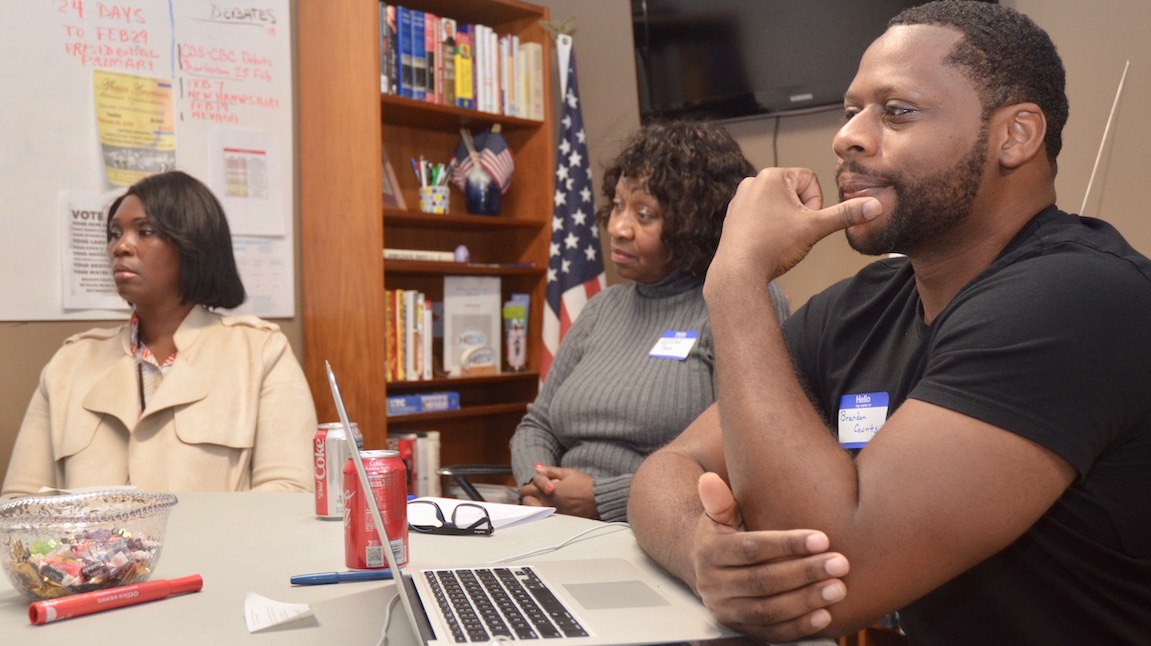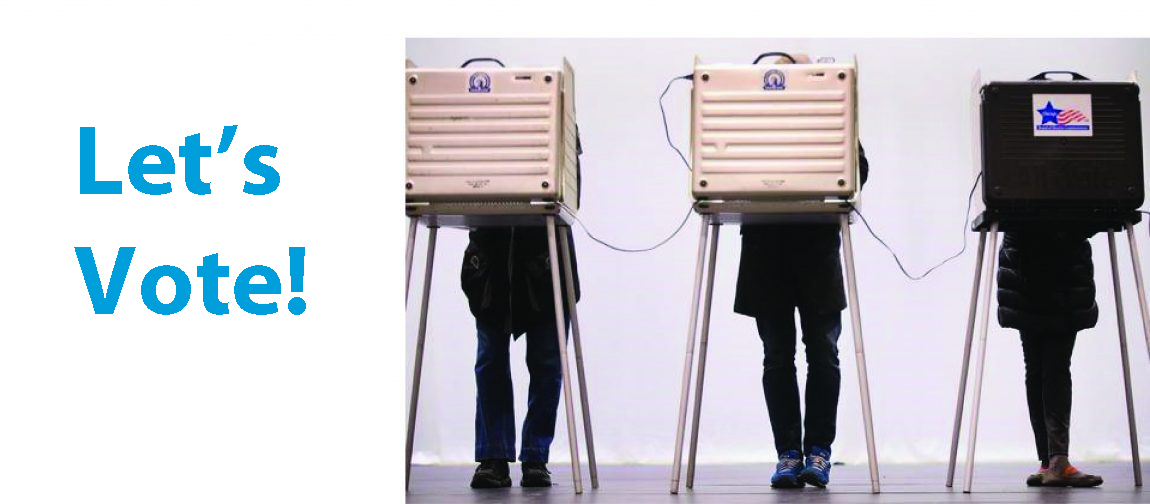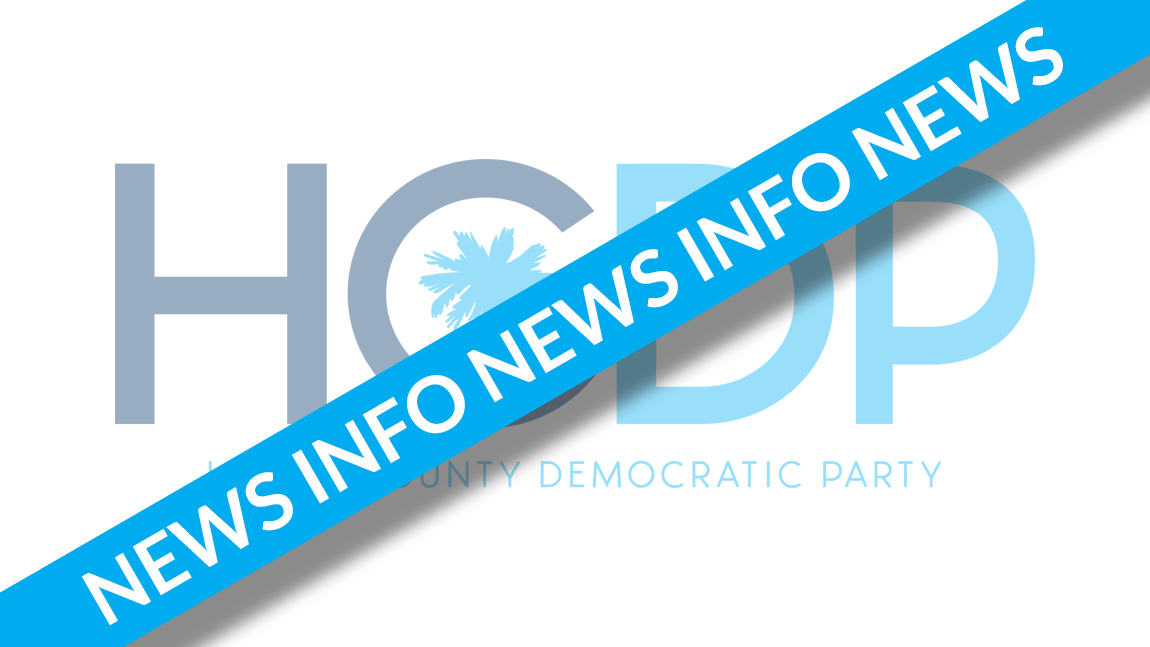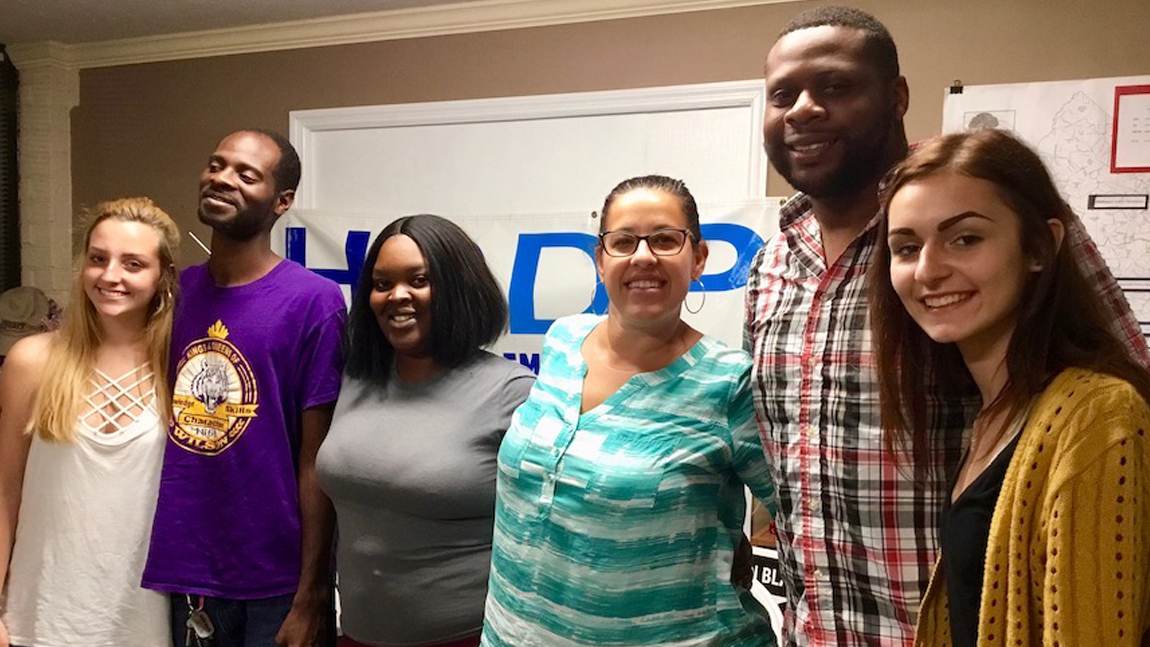Above Photo: Shakedra Jenerette, Alester Linton-Pryor and Brandon Counts
By V. Susan Hutchinson
Editor’s Note: On February 5 a small group of African American community activists and leaders came together at the Horry County Democratic Party Office (HCDP)in Conway for a candid discussion on issues affecting African Americans.
This article is the last in a 4-part series. Links to the other articles are at the end of the article.
A video representing the complete discussion is available here. This article is taken from the comments in the video from 1:30:17 to the end.
For the list of participants please see HORRY DEMOCRATS HOST AFRICAN AMERICAN ISSUES FORUM.
Reparations
What about reparations? Should African Americans today, whose ancestors were held as slaves, receive some sort of financial payment for the free labor provided by those slaves, and the harsh treatment that many endured?
That issue was discussed in the closing minutes of the Forum. Moderator Dameion Fowler asked the group to answer yes or no, with an explanation for their answer.
Shakedra Jenerette began by saying yes, but wasn’t certain what form it should take or what metrics would be used to make the decisions. “For all that has been taken from us as a people, we are owed something,” she said. While reparations shouldn’t necessarily be financial in nature, there should be some form of compensation, she said.
Brandon Counts responded with a “no,” commenting, “I don’t think it will solve the problem when it comes to disparity in wealth.” And, he said, “I think it will create more divisiveness between the ethnic groups,” further fueling hatred of minorities held by Trump supporters.
While Verlene DeWitt said she was torn, leaned towards saying no. DeWitt pointed out that some slave owners were black, and how do you justify reparations in that context?
Pastor Thomas Dixon said “yes, but not monetarily,” explaining that reparations would “settle a debt” that is long overdue. However, he called for an innovative approach, such as putting money into the educational system for African American students. He agreed with Pryor about the need for teaching financial responsibility because without the money management knowledge, monetary compensation would be wasted.
Black Class Differences
Fowler then challenged participants to discuss class differences within the black community. He cited a Pew research poll that reported upper middle class blacks tend to look down on black workers; similar to how white Americans look down on them.
“Is the class rift in the black community so severe that it may be a stumbling block to pushing forward a black agenda?” he asked.
Pastor Dixon noted that the upper-class black community came about after the Civil Rights Act was passed as it created more opportunities for blacks through affirmative action programs. Wealthier blacks, he said, are actually more focused on getting equality for all and not necessarily dismissing working class blacks based on their lower income level. They are looking to “elevate the community as a whole,” he said.
Brandon Counts concurred and said he sees more of a class difference here in South Carolina than what he saw in New York and Washington state. Until the African American community in South Carolina comes together and breaks these ties, he said, “We won’t be able to grow or make ourselves a stronger presence here in South Carolina. We won’t have that same effect that Martin Luther King had.” Counts believes future leaders need to come from the poorer class and go on to inspire across all black classes.
Verlene DeWitt said it was drilled into her head early on that you are required to give back. “You are your brother’s keeper,” she said. Helping, she stressed, doesn’t mean giving people a handout, it means educating them on exercising self-control and letting them know it’s OK to be smart to better themselves.
The Role of the Black Church
Fowler’s next question was “What role should the black church play?”
Pastor Dixon chastised black churches for not getting out into the community more. They should go out and “help the community where they are at and not where they think they are supposed to be at,” he said.
DeWitt said the church should be the pillar of the community and welcome people and help them reach their potential through training and other support.
Pryor said the black church needs to stop judging and get out in the community to “teach our people about family, teach our people about love, teach people about how to educate, how to be responsible for one another.”
Doing this, she said is “being Christian” as opposed to “being religious.” Pryor expressed her concerns that being a “Christ-like” Christian is lost under the Trump administration, where children at the border are in cages, shot in the streets, and where there are large numbers of homeless veterans. She fears that this will still be happening 20 years from now if true Christians don’t show the required outrage.
Jenerette’s view was that churches have become a disease and are now big business. She said she knows more people who have been hurt instead of helped by the church, although churches can be a resource and asset to the black community, they are not living up to their potential, she asserted.
Activities and Events from the Forum Members
Pastor Dixon encouraged people to get involved in his Coalition organization, which he is focusing on more now since the end of the North Charleston mayoral election.
Verlene DeWitt is continuing her work with voter registration by looking at purged voter lists and contacting people to get them re-registered. She is passionate about registering voters in Horry County.
Brandon Counts said his main goal is to get more young Democrats “active and excited about voting.” The Young Democrats of Horry County are trying to get U.S. senatorial candidate Jaime Harrison and 7th Congressional district candidates to Horry County to speak at an open forum for young people to be scheduled soon.
Alester Linton-Pryor, president of the Carolina Forest Democratic Club, said the club, as part of Black History Month, is doing a community voter registration drive on February 16, after services, at a community church.
Shakedra Jenerette, founder of I Am Enough, has organized a 5K “Run for the Culture” event on February 29 at Loris High School. The cost to participate is $10 to register online and $15 on the day. Anyone is welcome to participate. Food and other activities will be available. The purpose, she said, “is to empower and encourage black and brown children.” Participants must answer two questions on the registration form. “What are you running from?” and “What are you running to?”
In lieu of, or in addition to, running, donations to Run for the Culture are also welcome. Donations can be made through www.paypal.me/yesiamenough or on a smart phone via Cash App under Yes I Am Enough. For additional information or to register for this event go to www.yesiamenough.com/event-registration/
Conclusion
America has a long way to go to address all of the concerns of African Americans. Elected officials need to listen more closely to not only understand their needs, but to know how and why change needs to happen. There is a long history of inequality that has still not been addressed.
HCDP greatly appreciates the open and honest opinions of all the forum participants and hopes they will continue to speak out for change.
“This was an excellent discussion, candid, honest and we appreciate it very much,” said HCDP Chair Don Kohn. “The points that were raised are important and will help guide HCDP activities in the months ahead.”
Links to previous articles in the series:
Horry County African American Issues Forum: The Age of Trump
Horry County African American Issues Forum: Voting the Black Agenda
Horry County African American Issues Forum: Education, and the Racial Wealth Gap





